Americans hold a wide range of beliefs about spirits and related matters. Some views that may be considered spiritual – such as belief in God or another “higher power” – are very common across all major demographic groups, including among many religiously unaffiliated Americans.
Some other beliefs – such as in the possibility of reincarnation, or in spiritual energy within crystals and stones – are much less common.
About nine-in-ten U.S. adults believe in God or another higher power, including 54% who say they believe in “God as described in the Bible” and 34% who say they don’t believe in the biblical depiction of God but do believe there is “some other higher power or spiritual force in the universe.”
More than eight-in-ten Americans believe that people have a soul or spirit (83%) and 81% say there is something spiritual beyond the natural world, even if we cannot see it.
In addition, majorities of U.S. adults believe in heaven (71%) and hell (61%), and more than half say that it is “probably” or “definitely” true that the deceased can be reunited with loved ones who have already died. (Far fewer say this is “probably not” or “definitely not” true.)
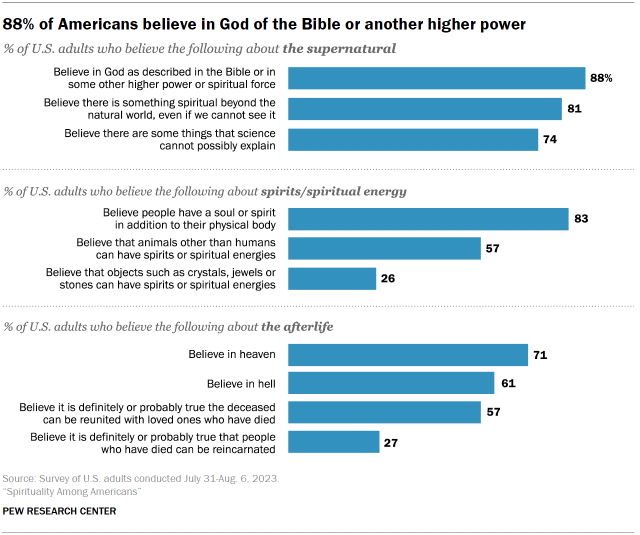
This chapter goes into depth on these topics and also presents Americans’ views on related questions such as:
- What is the nature of spirits, and do (nonhuman) animals have spirits? Can places like cemeteries and parts of nature like mountains have spirits or spiritual energies?
- What happens after people die? Do their spirits remain in contact with the living world? Can they help or harm the living?
Belief that people have a soul or spirit
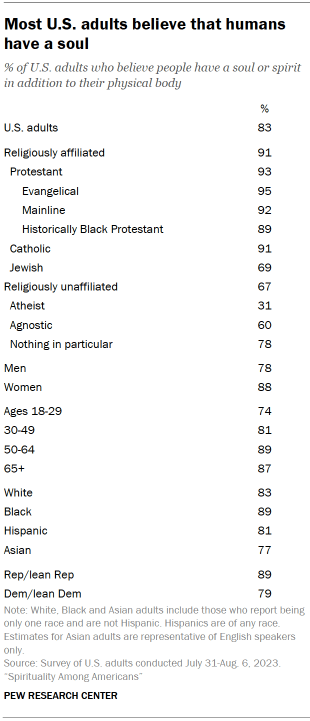
Most Americans (83%) believe that people have a soul or spirit in addition to their physical body. Overwhelming majorities of Protestants (93%) and Catholics (91%) express this belief, as do smaller majorities of Jews (69%) and the religiously unaffiliated (67%).
Older Americans are more likely to believe people have a soul or spirit. Among U.S. adults ages 50 and older, 88% hold this belief, compared with 81% of those ages 30 to 49 and 74% of adults under 30.
This belief is somewhat more common among women than men, and also more prevalent among Republicans and independents who lean toward the Republican Party than among Democrats and Democratic leaners.
Belief in God or a higher power
Americans overwhelmingly believe in God or some other higher power.
More than half of U.S. adults (54%) say they believe in “God as described in the Bible,” while about one-third (34%) say they do not believe in God as described in the Bible but do believe there is some other higher power or spiritual force in the universe.
One-in-ten U.S. adults do not believe there is any higher power or spiritual force in the universe.
Americans who identify with a religion are more likely to say they believe in the God of the Bible than to say they believe in some other higher power or spiritual force (73% vs. 24%).
Large majorities of evangelicals (91%) and members of the historically Black Protestant tradition (86%) say they believe in God as described in the Bible, as do two-thirds of Catholics and mainline Protestants.
Similar shares of agnostics (64%) and those who describe their religion as “nothing in particular” (63%) believe in a higher power or spiritual force.
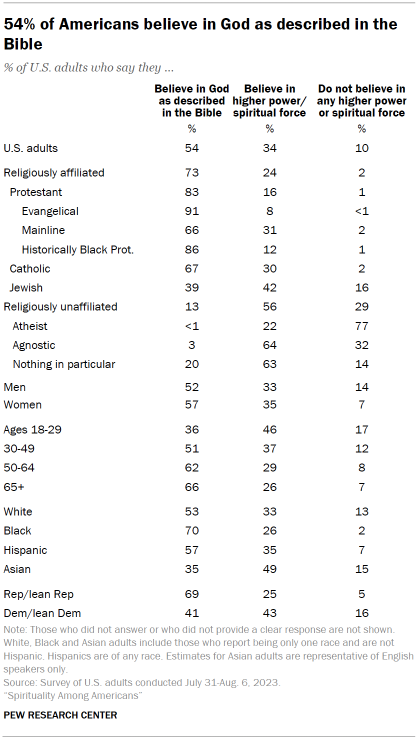
Most self-identified atheists do not believe there is any God, higher power or spiritual force (77%). But 22% of U.S. adults who describe themselves as atheists say they believe there is some “higher power or spiritual force” in the universe.
U.S. adults ages 30 and older are more likely to say they believe in God as described in the Bible, while those under 30 are more likely to believe in some other higher power or spiritual force.
Seven-in-ten Black Americans believe in God as described in the Bible, as do 57% of Hispanic Americans and 53% of White Americans. A minority of Asian Americans (35%) believe in God as described in the Bible. While a majority of Republicans and GOP leaners believe in God as described in the Bible (69%), Democrats and Democratic leaners are more divided: 41% believe in the God of the Bible, 43% believe in another higher power or spiritual force and 16% do not believe in either.
Belief in other spirits or unseen forces
We also asked respondents: “Regardless of whether you believe in God or a higher power in the universe, do you believe that other spirits or unseen spiritual forces exist?” Nearly two-thirds of Americans (65%) say they believe in spirits or unseen spiritual forces, while 14% say they do not. Around one-fifth are unsure.
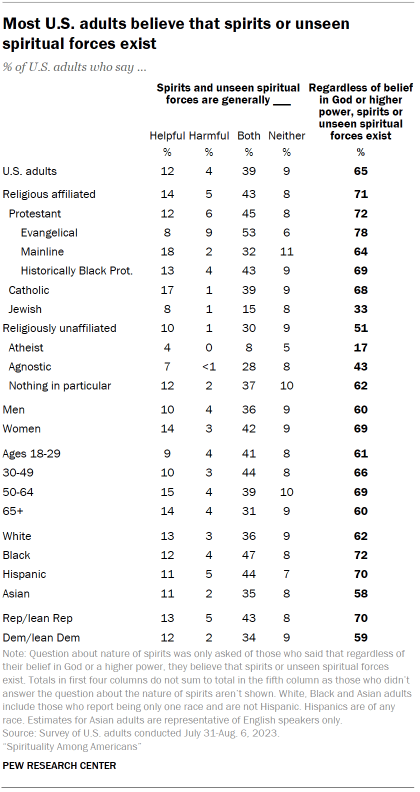
Protestants (72%) and Catholics (68%) are much more likely than Jewish Americans (33%) to believe in spirits or spiritual forces.
Among religious “nones” – those who answer a survey question about their religion by saying they are atheist, agnostic or “nothing in particular” – about half believe in spirits or unseen spiritual forces. Americans whose religious identity is “nothing in particular” (62%) are far more likely than self-identified agnostics (43%) and atheists (17%) to say they believe in spirits or spiritual forces.
Black (72%) and Hispanic Americans (70%) are more likely than White (62%) and Asian (58%) adults to believe in spirits or spiritual forces. Republicans and Republican-leaning independents (70%) are somewhat more likely than Democrats and Democratic leaners (59%) to believe in these things.
We also asked respondents who believe in spirits about their views on the nature of those spirits. About one-in-ten of all U.S. adults believe that spirits generally are helpful, while 4% say they generally are harmful.
A plurality of U.S. adults (39%) say that spirits can be both helpful and harmful. About one-in-ten Americans say that spirits are neither helpful nor harmful.
Belief beyond science and the natural world
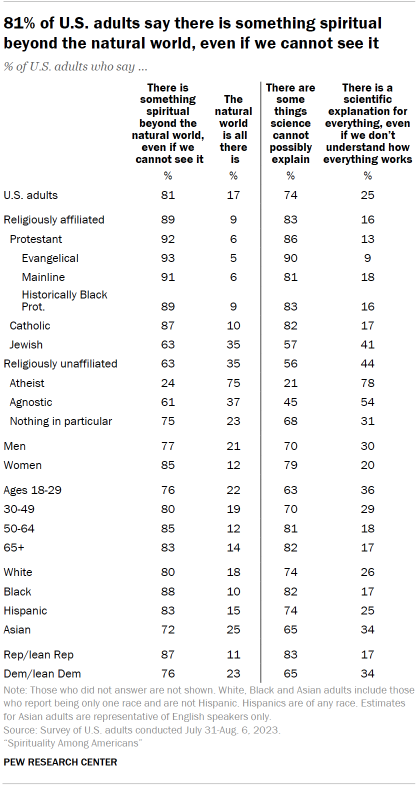
When asked which comes closer to their views – even if neither is exactly right – 81% of U.S. adults take the position that “there is something spiritual beyond the natural world, even if we cannot see it.” Far fewer (17%) say “the natural world is all there is.”
Large shares of Protestants (92%) and Catholics (87%) say there is something spiritual beyond the natural world, while smaller majorities of Jews and religiously unaffiliated adults say the same (63% each).
Self-described atheists are the only religious or nonreligious group with a majority saying that the natural world is all there is (75%).
About three-quarters of Americans say there are some things that science cannot possibly explain, while one-quarter say there is a scientific explanation for everything, even if we don’t understand how everything works.
Protestants (86%) and Catholics (82%) are especially likely to say there are some things that science cannot possibly explain, while fewer Jews (57%) and people who describe their religion as “nothing in particular” (68%) hold this view. About half of agnostics and 78% of atheists say there is a scientific explanation for everything.
Where do spirits and spiritual energies reside?
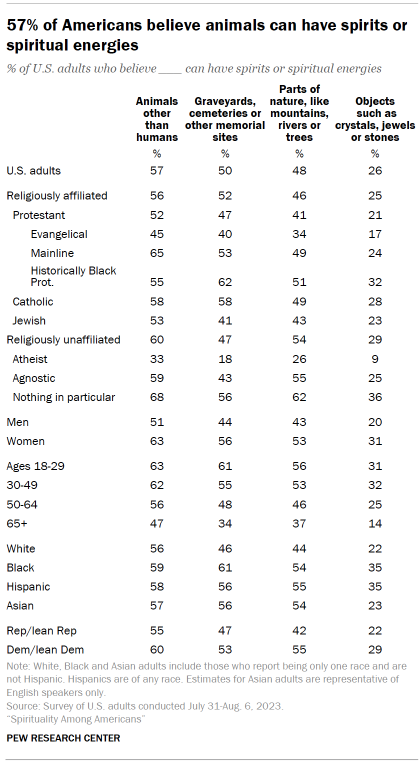
In addition to asking whether humans have a soul or spirit, the survey explored Americans’ views on whether certain places, objects or parts of the natural landscape can have spirits.
Respondents were asked whether each of the following can have “spirits or spiritual energies”: parts of nature like mountains, rivers or trees; certain objects like crystals, jewels or stones; animals other than humans; and graveyards, cemeteries or other memorial sites.
Most U.S. adults believe that animals other than humans can have spirits or spiritual energies (57%).
Slightly fewer say that graveyards, cemeteries or other memorial sites (50%) and parts of nature like mountains, rivers or trees (48%) can have spirits. And about a quarter of Americans say objects such as crystals, jewels or stones can have spiritual energies (26%).
The belief that animals other than humans can have spirits or spiritual energies is held by half or more members of almost every religious and nonreligious group analyzed in this survey, save for two exceptions: evangelical Protestants (45%) and atheists (33%).
On many questions in the survey – such as belief in God and belief in heaven and hell – evangelicals and atheists are at opposite ends of the spectrum of public opinion. But on the question of whether (nonhuman) animals have spirits, they tend to express the same view: No. Taking into account how these groups answered a separate question about whether people have a soul or spirit, it appears that many evangelicals believe that only humans have spirits, while most atheists believe that neither humans nor animals have spirits.
Members of the historically Black Protestant tradition (62%) and Catholics (58%) are among those most likely to believe that graveyards and cemeteries can have spiritual energies.
The belief that parts of nature, such as mountains, rivers or trees, can have spirits or spiritual energies is somewhat more common among “nones” – especially among those who say their religion is “nothing in particular” – than among the religiously affiliated. Those who identify as “nothing in particular” are also among the most likely to believe that objects like crystals and jewels can have spirits.
Beliefs about the afterlife
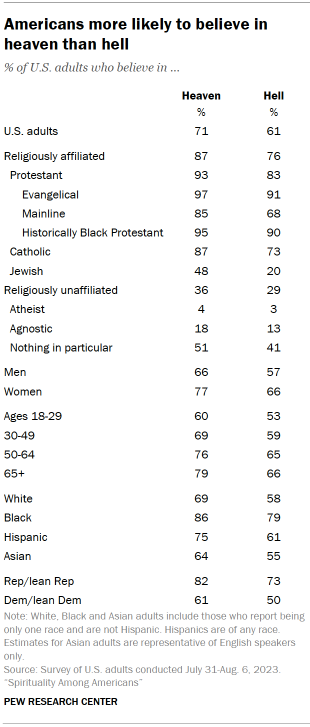
What do Americans believe about life after death? The survey asked respondents about the existence of heaven and hell and also probed what they think people who have died are capable of doing.
Heaven and hell
Seven-in-ten Americans believe in heaven (71%), and six-in-ten believe in hell (61%).
Overwhelming majorities of evangelical Protestants and members of historically Black Protestant churches believe in both heaven and hell, while smaller majorities of mainline Protestants and Catholics hold these beliefs.
Jews are far more likely to believe in heaven (48%) than in hell (20%). The vast majority of religiously unaffiliated Americans do not believe in either, with few atheists who believe in heaven (4%) or hell (3%).
About eight-in-ten Republicans and adults who lean toward the Republican Party believe in heaven, compared with about six-in-ten Democrats and Democratic leaners. Nearly three-quarters of Republicans believe in hell, while half of Democrats say the same.
Black Americans are more likely than other large racial and ethnic groups in the survey to believe in heaven and hell.
Pew Research Center has asked about belief in heaven and hell before, including in a 2021 survey on human suffering, which we conducted during the COVID-19 pandemic. At the time, 73% of U.S. adults said they believe in heaven, and 62% said they believe in hell. Our 2007 and 2014 Religious Landscape Studies showed a similar pattern, although those surveys used somewhat different wording and were conducted by telephone – and therefore are not directly comparable to more recent ones. For more detail on surveys that have asked about heaven and hell since 2017, refer to the Topline.
What are the dead capable of?
We asked respondents whether they believe it is “definitely true,” “probably true,” “probably not true,” or “definitely not true” that people who have died can do various things, such as be aware of what is happening among people who are still alive and help (or harm) them. We also asked whether the dead can communicate with the living, whether they can reunite with loved ones in the afterlife, and whether they can be reborn in this world.
In this list of six options, the most common belief is that the dead can be reunited with loved ones, which 57% of U.S. adults say is “definitely” or “probably” true. Fewer Americans believe it is true that the dead can assist, protect or give guidance to the living (46%), be aware of things that are going on with the living (44%) or communicate with them (42%).
(About four-in-ten Americans also say they have ever had a strong feeling that someone who has passed away was trying to communicate with them. For a discussion of this question, jump to Chapter 4.)
About one-quarter of adults say it is definitely or probably true that the dead can be reincarnated (i.e., reborn again and again in this world). The least common of these beliefs is that the dead can harm people who are still living: 18% of Americans say this is true.
Catholics and members of historically Black Protestant churches are among the most likely to believe it is definitely or probably true that people who have died can be reunited with others beyond this world, provide assistance to the living, be aware of things going on among those who are still living or communicate with them. Those who say their religion is “nothing in particular” are among the most likely to believe it is true that people can be reincarnated (39%) or harm people who are still living (25%).
Higher shares of women than men say it is probably true that the dead can interact with the human world, such as being aware of things going on among the living, communicating with the living, and assisting or harming the living. Women are also more likely than men to say they believe that the dead can be reincarnated and that the dead can be reunited with loved ones in the afterlife.
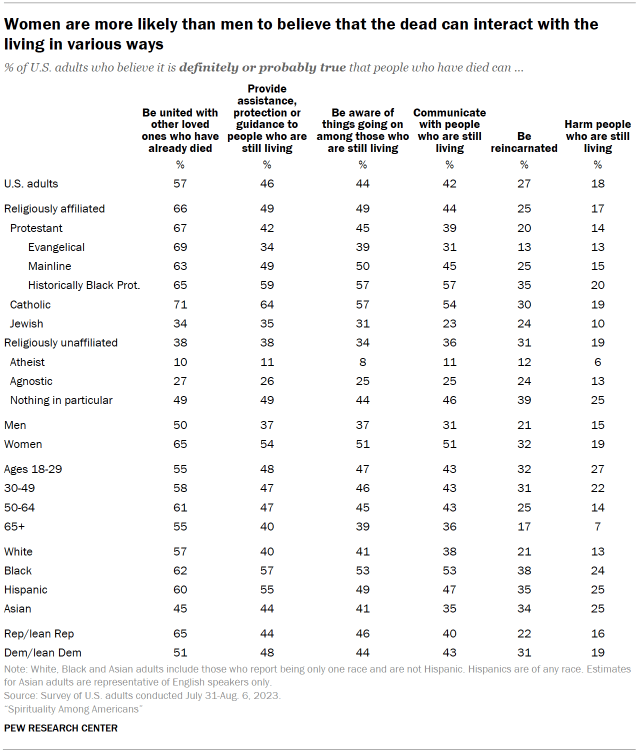
Previously, in August 2023, Pew Research Center published a short report focused on Americans’ views about communicating with the dead. Based on a survey conducted in spring 2023, we found that 53% of U.S. adults said they had ever been visited by a dead family member in a dream or in any other form, and that substantial shares said they’d had other types of interactions with dead relatives in the past 12 months, such as telling a dead relative about their life.




